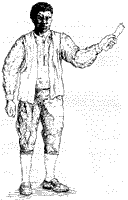
He was born a slave in the North American colonies and worked in his master's flour mill in North Carolina. During the American Revolution, Peters ran away and joined the British Army, becoming a sergeant in the Black Pioneers. When the British lost the war, they evacuated Peters and hundreds of other Black Loyalists to Nova Scotia — but after seven years in Canada, the former slaves had still received no land and were living only on a meagre government ration and suffering from the cold.
Peters, though poor and uneducated, found the courage to travel to England in search of help for his people. He was in grave danger from the moment he left Canada, as he was still legally a slave in the newly-independent United States, and could have been taken there and sold back into slavery by an unscrupulous sea captain. But Thomas Peters managed to reach London, and he convinced the Sierra Leone Company to send ships to help his people establish a colony in Africa.
He then returned to Nova Scotia and, by sheer force of personality, persuaded over eleven hundred former slaves to join him in the voyage to Sierra Leone. Thomas Peters and his "Nova Scotians" founded Freetown in 1792 near the site of the Province of Freedom, which had been destroyed several years earlier.
But problems soon developed when the white men of the Sierra Leone Company insisted on running the colony as they saw fit. Thomas Peters confronted the English commander, demanding that his people run their own affairs through an elected committee, but he was unsuccessful in his attempt to establish self-rule. He died shortly afterwards, a victim of malaria in the colony's first rainy season.
Thomas Peters was totally committed to freedom, and fought for it until the very last day of his life. More than anyone else, he exemplifies the spirit of hope and determination that gave birth to the city of Freetown.







